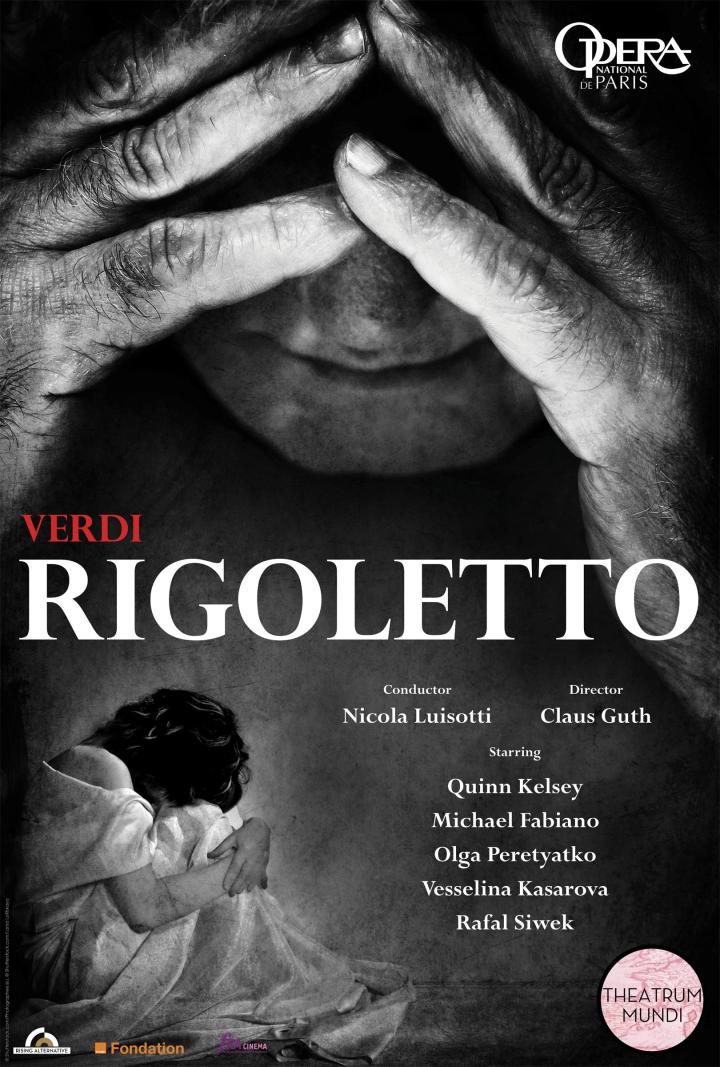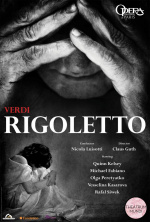Rigoletto
Rigoletto
Part of our Culture Vulture series. For more screenings and information, visit: www.laemmle.com/culturevulture.
RIGOLETTO
Giuseppe Verdi
Libretto by M. Piave
Opera in 3 acts
Sung in Italian
Libretto by Maria Piave - After Victor Hugo, Le Roi s’amuse
Opera de Paris (Opéra Bastille)
Recorded Spring 2016
Presented by Alain Duault
Approximate Running Time: 2h 5min
Approximate Running Time by Act:
Act I: 60 min
Act II & III: 65 min
CREATIVE TEAM
Conductor Nicola Luisotti
Director Claus Guth
Sets Christian Schmidt
Costumes Christian Schmidt
Lighting Olaf Winter
Choir Director José Luis Basso
ARTISTIC TEAM
Il Duca di Mantova Michael Fabiano
Rigoletto Quinn Kelsey
Gilda Olga Peretyatko
Sparafucile Rafal Siwek
Maddalena Vesselina Kasarova
Giovanna Isabelle Druet
Il Conte di Monterone Mikhail Kolelishvili
Marullo Michal Partyka
Matteo Borsa Christophe Berry
Il Conte di Ceprano Tiago Matos
La Contessa Andreea Soare
Paggio della Duchessa Adriana González
Usciere di Corte Florent Mbia
Orchestra and Choir of the Opéra National de Paris
Presentation
“Oh! Victor Hugo’s Le Roi s’amuse is the greatest subject, and perhaps the greatest drama of modern times. It’s a work worthy of Shakespeare!” A few months before he wrote those words to Francesco Maria Piave urging him to “turn Venice upside down and persuade the Censor to authorize the subject” – no easy matter given that moral values would be easily offended – Verdi was working on an adaptation of King Lear.
No doubt, he was already imbued with the play by his revered master, Shakespeare, when he read Victor Hugo's drama. On discovering in the works of the French writer to whom he would owe Ernani, the greatest triumph of his “difficult years”, a parallel with the triangle formed by the King, his daughter and the jester, it was “like a thunderbolt, an inspiration”. Between the frivolous, licentious Duke, and Gilda, a victim of the ignorance which holds her captive, stands the double-faceted character of the hunchback, both buffoon and curse-obsessed father. Monstrous and heartrending, grotesque and sublime, the title role reaches its apogee in the aria “Cortigiani, vil razza dannata”, whose descending movement, from the explosion of rage to the moment of entreaty, confirms the composer’s ability to adapt a form inherited from bel canto to theatrical realism.
Under the baton of Nicola Luisotti, this new production of Rigoletto marks director Claus Guth’s first collaboration with the Paris Opera.
Synopsis
Act I
During a party at the Duke’s palace in Mantua, the Duke brags of his romantic conquests. He surveys his court to choose a woman with whom to pass the night and selects the Countess Ceprano. Rigoletto, the hunchbacked court jester, mocks her cuckolded husband. Marullo reveals that Rigoletto has a secret lover whom he goes to see each night. Together with the Count of Ceprano, they decide to kidnap the woman. The Count of Monterone enters, demanding justice for the honor of his daughter, who was seduced by the Duke. Rigoletto insults him, and Monterone curses the Duke and Rigoletto. Rigoletto is very troubled by the curse, and fears for the safety of his daughter, whom he has kept carefully hidden from the courtiers.
On his way home, the jester meets Sparafucile, an assassin who offers him his services, but Rigoletto declines. He returns home and greets Gilda, his daughter, the woman the court mistakenly suspects of being his lover. When Rigoletto leaves, the Duke bribes Gilda’s governess, and presents himself to Gilda as a poor student named “Gualtier Maldè.” He declares his love for Gilda, whose beauty he admired in church. He hears footsteps, and escapes. The courtiers approach and trick Rigoletto into helping them kidnap Gilda.
Act II
The courtiers tell the Duke that they have abducted Rigoletto’s lover and that she is enclosed in the Duke’s bedchamber. He realizes that it is Gilda, and excitedly goes to her. The jester confronts the courtiers, and astonishes them by saying that they have kidnapped his daughter (not his lover.) A bed-tousled Gilda enters. Alone with her father, she confesses her love for the Duke. As Monterone is being taken to the dungeon, Rigoletto vows vengeance on the Duke who has ruined his daughter.
Act III
Rigoletto has brought Gilda to Sparafucile’s inn to show her the real nature of the man she loves. The Duke, once again incognito, flirts with Sparafucile’s sister, Maddalena. Gilda laments his faithlessness, but still loves him. Rigoletto sends her home, disguised as a boy in order to avoid notice. Rigoletto then hires Sparafucile to kill the Duke. According to their agreement, Sparafucile will kill the Duke and deliver him in a sack to the jester. However, his sister wants to save the handsome young man. Therefore, they decide to kill the first person to appear at the inn, in order to deceive the hunchback. Gilda, having heard everything, knocks at the inn’s door, ready to die in order to save the man she loves. She enters the inn, and is stabbed. Sparafucile gives Rigoletto the sack with the corpse, but in the distance, the Duke can be heard singing. With horror, the hunchback discovers that Gilda is in the sack; she dies, asking for his forgiveness, and Rigoletto remembers Monterone’s curse.
Giuseppe Verdi
Libretto by M. Piave
Opera in 3 acts
Sung in Italian
Libretto by Maria Piave - After Victor Hugo, Le Roi s’amuse
Opera de Paris (Opéra Bastille)
Recorded Spring 2016
Presented by Alain Duault
Approximate Running Time: 2h 5min
Approximate Running Time by Act:
Act I: 60 min
Act II & III: 65 min
CREATIVE TEAM
Conductor Nicola Luisotti
Director Claus Guth
Sets Christian Schmidt
Costumes Christian Schmidt
Lighting Olaf Winter
Choir Director José Luis Basso
ARTISTIC TEAM
Il Duca di Mantova Michael Fabiano
Rigoletto Quinn Kelsey
Gilda Olga Peretyatko
Sparafucile Rafal Siwek
Maddalena Vesselina Kasarova
Giovanna Isabelle Druet
Il Conte di Monterone Mikhail Kolelishvili
Marullo Michal Partyka
Matteo Borsa Christophe Berry
Il Conte di Ceprano Tiago Matos
La Contessa Andreea Soare
Paggio della Duchessa Adriana González
Usciere di Corte Florent Mbia
Orchestra and Choir of the Opéra National de Paris
Presentation
“Oh! Victor Hugo’s Le Roi s’amuse is the greatest subject, and perhaps the greatest drama of modern times. It’s a work worthy of Shakespeare!” A few months before he wrote those words to Francesco Maria Piave urging him to “turn Venice upside down and persuade the Censor to authorize the subject” – no easy matter given that moral values would be easily offended – Verdi was working on an adaptation of King Lear.
No doubt, he was already imbued with the play by his revered master, Shakespeare, when he read Victor Hugo's drama. On discovering in the works of the French writer to whom he would owe Ernani, the greatest triumph of his “difficult years”, a parallel with the triangle formed by the King, his daughter and the jester, it was “like a thunderbolt, an inspiration”. Between the frivolous, licentious Duke, and Gilda, a victim of the ignorance which holds her captive, stands the double-faceted character of the hunchback, both buffoon and curse-obsessed father. Monstrous and heartrending, grotesque and sublime, the title role reaches its apogee in the aria “Cortigiani, vil razza dannata”, whose descending movement, from the explosion of rage to the moment of entreaty, confirms the composer’s ability to adapt a form inherited from bel canto to theatrical realism.
Under the baton of Nicola Luisotti, this new production of Rigoletto marks director Claus Guth’s first collaboration with the Paris Opera.
Synopsis
Act I
During a party at the Duke’s palace in Mantua, the Duke brags of his romantic conquests. He surveys his court to choose a woman with whom to pass the night and selects the Countess Ceprano. Rigoletto, the hunchbacked court jester, mocks her cuckolded husband. Marullo reveals that Rigoletto has a secret lover whom he goes to see each night. Together with the Count of Ceprano, they decide to kidnap the woman. The Count of Monterone enters, demanding justice for the honor of his daughter, who was seduced by the Duke. Rigoletto insults him, and Monterone curses the Duke and Rigoletto. Rigoletto is very troubled by the curse, and fears for the safety of his daughter, whom he has kept carefully hidden from the courtiers.
On his way home, the jester meets Sparafucile, an assassin who offers him his services, but Rigoletto declines. He returns home and greets Gilda, his daughter, the woman the court mistakenly suspects of being his lover. When Rigoletto leaves, the Duke bribes Gilda’s governess, and presents himself to Gilda as a poor student named “Gualtier Maldè.” He declares his love for Gilda, whose beauty he admired in church. He hears footsteps, and escapes. The courtiers approach and trick Rigoletto into helping them kidnap Gilda.
Act II
The courtiers tell the Duke that they have abducted Rigoletto’s lover and that she is enclosed in the Duke’s bedchamber. He realizes that it is Gilda, and excitedly goes to her. The jester confronts the courtiers, and astonishes them by saying that they have kidnapped his daughter (not his lover.) A bed-tousled Gilda enters. Alone with her father, she confesses her love for the Duke. As Monterone is being taken to the dungeon, Rigoletto vows vengeance on the Duke who has ruined his daughter.
Act III
Rigoletto has brought Gilda to Sparafucile’s inn to show her the real nature of the man she loves. The Duke, once again incognito, flirts with Sparafucile’s sister, Maddalena. Gilda laments his faithlessness, but still loves him. Rigoletto sends her home, disguised as a boy in order to avoid notice. Rigoletto then hires Sparafucile to kill the Duke. According to their agreement, Sparafucile will kill the Duke and deliver him in a sack to the jester. However, his sister wants to save the handsome young man. Therefore, they decide to kill the first person to appear at the inn, in order to deceive the hunchback. Gilda, having heard everything, knocks at the inn’s door, ready to die in order to save the man she loves. She enters the inn, and is stabbed. Sparafucile gives Rigoletto the sack with the corpse, but in the distance, the Duke can be heard singing. With horror, the hunchback discovers that Gilda is in the sack; she dies, asking for his forgiveness, and Rigoletto remembers Monterone’s curse.
Genre
Culture Vulture,
Opera
Runtime
125
Language
Italian
Played at
Monica Film Center 7.04.16 - 7.05.16
Fine Arts Theatre 7.04.16 - 7.05.16
Playhouse 7 7.04.16 - 7.05.16
Claremont 5 7.04.16 - 7.05.16
Town Center 5 7.04.16 - 7.05.16
Rigoletto Get Tickets
There are currently no showtimes for this film. Please check back soon.

